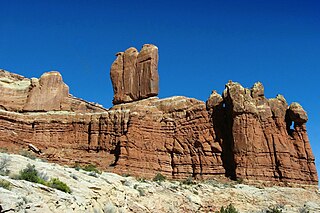
The Titan is a 6,112-foot-elevation (1,863-meter) pillar in Grand County, Utah, United States.

Bridger Jack Butte is a sandstone butte located in Bears Ears National Monument, in San Juan County, Utah, United States. Set at the northern tip of Bridger Jack Mesa and above the confluence of Indian and Lavender Creeks, the summit rises to an elevation of 5,890 feet, and towers over 700 feet above the surrounding terrain and floor of Lavender Canyon to its west. This landmark is situated four miles southeast of the Sixshooter Peaks, and is visible from State Route 211 between Newspaper Rock and the Needles District of Canyonlands National Park. "Bridger Jack" was a Paiute medicine man.

Assembly Hall Peak is a 6,395-foot-elevation (1,949-meter) summit in Emery County, Utah, United States.

Eagle Mesa is a 6,624-foot-elevation (2,019-meter) summit in San Juan County, Utah, United States.

Castle Butte is a 5,700-foot-elevation (1,737-meter) summit in San Juan County, Utah, United States.

Lady in the Bathtub is a 5,552-foot-elevation (1,692-meter) pillar in San Juan County, Utah, United States.

Rooster Butte is a 5,145-foot-elevation (1,568-meter) summit in San Juan County, Utah, United States.

Battleship Rock is a 5,422-foot-elevation (1,653-meter) summit in San Juan County, Utah, United States.

Seven Sailors is a 4,860-foot-elevation (1,481-meter) pillar in San Juan County, Utah, United States.

De Gaulle and His Troops is a 5,540-foot-elevation (1,689-meter) summit in San Juan County, Utah, United States.

Adobe Mesa is a 7,475-foot-elevation (2,278-meter) summit in Grand County, Utah, United States.

Argon Tower is a 4,750-foot-elevation (1,448-meter) pillar in Grand County, Utah. It is located within Arches National Park and like many of the rock formations in the park, Argon Tower is composed of Entrada Sandstone. The tower is 260 feet tall, and topographic relief is significant as the summit rises 450 feet vertically above the Park Avenue Trail in 400 feet laterally. Precipitation runoff from Argon Tower drains to the nearby Colorado River via Courthouse Wash. This landform was shown briefly in the opening scene credits of the 1989 American action-adventure film Indiana Jones and the Last Crusade.

Three Penguins is a 4,488-foot-elevation (1,368-meter) summit in Grand County, Utah, United States.

Tower of Babel is a 4,655-foot-elevation (1,419-meter) summit in Grand County, Utah. It is located within Arches National Park and like many of the rock formations in the park, it is composed of Entrada Sandstone. The tower is 500 feet tall, and topographic relief is significant as the summit rises 500 feet vertically above the main park road in approximately 200 feet laterally. Precipitation runoff from Tower of Babel drains to the nearby Colorado River via Courthouse Wash. This landform's descriptive toponym has been officially adopted by the United States Board on Geographic Names. This landform was shown briefly in the opening scene of the 1989 American action-adventure film Indiana Jones and the Last Crusade.

The Organ is a 4,735-foot-elevation (1,443-meter) pillar in Grand County, Utah, United States

Cottontail Tower is a 5,980-foot-elevation (1,823-meter) pillar in Grand County, Utah, United States.

Ancient Art is a 5,420-foot-elevation (1,652-meter) pillar in Grand County, Utah, United States.

Echo Tower is a 5,784-foot-elevation (1,763-meter) pillar in Grand County, Utah, United States.

The Oracle is a 6,060-foot-elevation (1,847-meter) pillar in Grand County, Utah, United States.

Family Butte is a 7,405-foot-elevation (2,257-meter) summit in Emery County, Utah, United States.



























